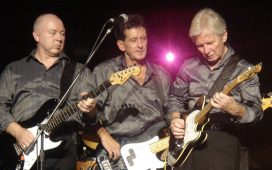Nowhere are the BBC’s attempts to be everything to everyone more nakedly exposed than in the Last Night of the Proms. Is it a flag-waving, chorus-yelling party with unexpectedly classy background music, or is it a real concert – the culmination of the world’s biggest classical festival – with a few rowdy gatecrashers? Either would be fine, but as this year’s front-page wrestling match over Rule, Britannia! proved, it really can’t be both.
Generally the balance tips in favour of the Union flag brigade but this year, with no Prommers to link arms and sing Auld Lang Syne, things were rather different. The decision not to allow a live audience into London’s largest concert hall this season has seemed at best cowardly and at worst wilful, but it did give us a Last Night like no other before – an evening of music that comforted, nourished and, dare I say it, even moved.
Key to this was the Scottish violinist Nicola Benedetti. A late replacement for indisposed soloist Lisa Batiashvili, she performed Vaughan Williams’ The Lark Ascending with such unshowy ease that it felt like the first cousin of the folk music we heard later from performers in Tenby and Belfast.
The i newsletter cut through the noise
It wasn’t the evening for a diva and Benedetti recognised this, closing her eyes and letting her violin sing in music that seemed improvised in the moment, unobtrusively supported by Dalia Stasevska and a reduced-forces BBC Symphony Orchestra.
With musicians downsized from the usual 300 to just 65 players, things could easily have felt pinched or mean in the Royal Albert Hall. But canny programming meant we hardly missed them. Sibelius’s Impromptu for Strings was a gift from Stasevska’s Finnish homeland – soberly lovely, its chorale-like outer sections created a much-needed moment of contemplation between outbursts of exuberance. Then there was Andrea Tarrodi’s concise but richly textured new Solus, a response to the isolation of lockdown whose meaning – Alone – set up a tension later answered by Rodgers’ and Hammerstein’s anthemic You’ll Never Walk Alone.
But the engine of it all, radiating warmth and balm, was soprano Golda Schultz. Whether it was the unexpected sensuality of Susanna’s Deh vieni from The Marriage of Figaro or the rapturous wonder of Strauss’s Morgen!, or even a teenager’s dam-bursting worldly delight in Sondheim’s The Glamorous Life, Schultz took us with her, offering all the encounters, emotions and human connections lockdown has stifled and suppressed.
And what of the patriotic songs that prompted so many column inches? They sounded much as they always do. Some will have been enraged by them, others delighted, but when the rest of the music is as vivid, as hopeful, as joyful as it was here, it really doesn’t matter. Which is exactly as it should be.














